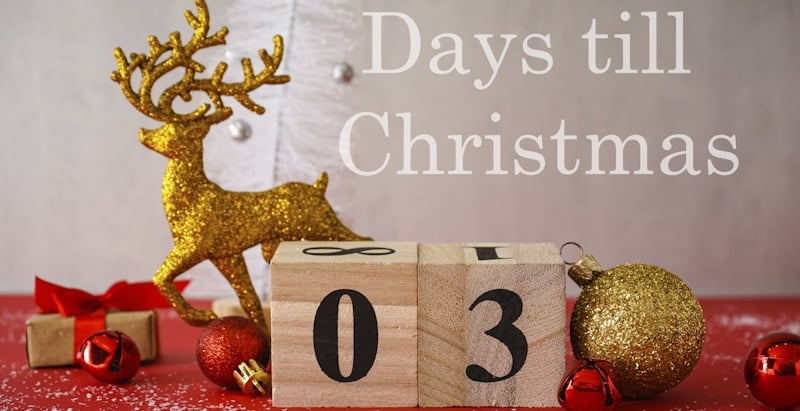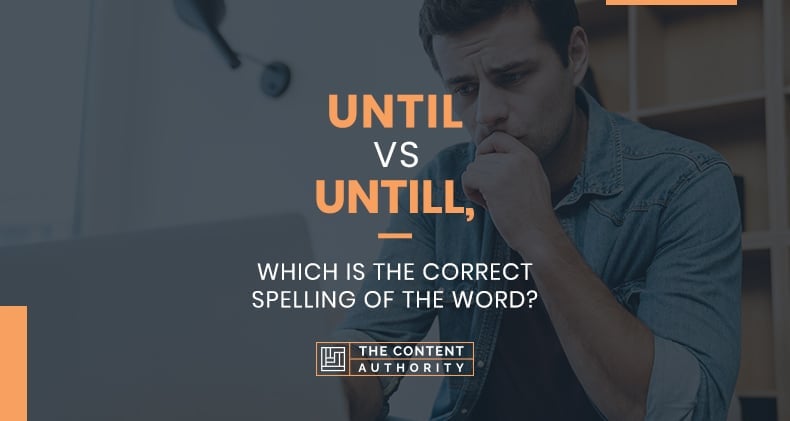Grammar rules can be overwhelming, we know. The spelling of the word “until” can be confusing because of all the variants we can find.
The correct spelling of the term “until” should be with a single “l.” We should not use the form “untill” because it is an obsolete spelling and is no longer accepted in a formal context. However, the confusion is valid because there is a history behind these two spelling forms.
But please don’t panic. We are here to break down the origin of the dilemma between “until,” “untill” and other related words. So, don’t stop reading until you hear the story.
What Do “Until” And “Untill” Mean?
As simple as it sounds, to better understand a word, we always recommend starting from its definition.
Cambridge dictionary states that “until” is a preposition, and it means “up to” (the point in time or the event mentioned). It indicates the limit of action, and it can refer to the moment one stops doing something.
- They will not stop insisting until there is a resolution.
- I don’t stop working until I’m satisfied with the outcome.
- “Until you forget me” is one of my favorite Luis Miguel songs.
“Untill” means the same as until, but it is an obsolete spelling of this word.
Research demonstrated that the correct spelling of the term “until” is with a single “l.” Grammar experts conducted a study to determine how frequently writers used the single “l” version or the double “ll” version. They also look for the context and who was using this word to determine its validity.
For example, they found that the single “l” “until” is frequently used in the printed text and by gatekeepers rather than in unchecked websites or sources. This fact adds more credibility and determines that “until” is a more appropriate spelling. As we write this article, the Google grammar and spelling feature does not recognize the double “ll” “untill” and suggests changing it to the single “l” “until.”
Curiously the word “untill” came first. Its history goes back to the sixteenth and seventeenth centuries.
History Of The Word “Untill”?
Studies indicate that the northern Middle English used the form “untill” from 1630 to 1660. The Old Nordic language combined “und” and “till”. They also used to spell “untill” with a “v” as “vntill.” However, our searches indicate it was more likely to find the word “vuntill” in literature and poetry.
During this time, alternative ways of spelling “until” arose.
Alternative Forms Of “Until.”
Grammar rules can be overwhelming because we can find different opinions and uses of words. Alternative forms of “until” include: til’, ’till, til,’ and ’til, and they are most commonly used in street signs and informal texts since they don’t follow the punctuation rules of printed texts.
“Till” And “‘Till”: Are These The Abbreviated Forms Of “Until”?
We can find several variants of the word “until” in contemporary language that imply an abbreviated form of spelling it. They can be found in street signs or a less formal environment.
- Olive garden is open from 9 AM ’till 9 PM.
- We have breakfast till 7 AM.
- Lunch from 12 till 5.
The Variant “Till.”
People from the fifteenth century used “till” predominantly. Tho means the same as “until,” it is far from being an abbreviation of this word. You can say that “till” is an urban expression rather than a short form of until.
For instance, people commonly write “untill” because they assume that until is the short version and logically accept that “untill” is the correct way. People also consider, phonetically speaking, that the extra “l” makes the word more balanced.
What About ” Til”?
The community started to use “til” in the late fifteenth century. However, its validity is in doubt because people used it within texts in other languages and incorrect transcriptions.
“‘Til”: Should You Add An Apostrophe?
Another variant is ’til with an apostrophe, and it arose during the seventeenth century. Writers started to use apostrophes to show contractions. However, the only example found back in the days was from a translation of Machiavelli ’til the event.
In addition to its various forms of spelling, the word until has other “difficulties” when it involves dates. In specific scenarios where there are deadlines to meet, its meaning can be ambiguous.
Does “Until” Include The Date?
As we already mentioned, the preposition “until” is used to explain when the action ends. It can also mean up to a specific date in time. However, this definition can be confusing and ambiguous depending on the context.
Read the following examples:
- The University of New Orleans will receive freshmen applications until January 10.
- The book will be available online until August 15.
Do you have to complete the application by January 10, including this day? Or do you have to complete the application before January 10, on January 9? You will not have access to the book on August 15, or does it include this day?
You can argue, for example, that if someone suggests a deadline until a specific date, you have until that same day to meet the deadline. Another person can argue that the deadline has to be completed the day before the deadline date.
But which one is correct?
To explain the previous example, we can say that you can complete the application on January 9. You can also say that they can be completed on January 10 because this is the last day of application. However, if you complete it on the 11, you will be too late.
In the second example, it is unclear if you will have access to the book on August 15 or the book will only be available until the day before, August 14. A better way to make deadlines clear is giving additional information such as “up to but not including” a specific day.
For example, instead of saying that “the book will be available online until August 15″, you can state, ” You will have access to the book no later than August 15″. It gives the certainty to the reader that they will have access to the book on August 15, but this will be the last day. You can also be clear on the specific dates:

When you go on vacation and write the “out of office” autoreply, instead of saying:
- I will be on vacation until March 28.
You can be more specific and say:
- I will be out of the office from March 19 until March 28, returning on March 29.
I know it can sound as if you are overexplaining, but in this context, I think it is worth the extra words! If you find yourself in an ambiguous situation, it’s better to cover yourself and be more specific. Remember that good communication is the basis of a healthy relationship with others. This situation can also motivate you not to leave things until the last minute, be ready and on time, and probably save your life! Well, I’m a little dramatic here, but it is better earlier than never.
But well, after my cheesy bad joke, let’s sum up what we’ve learned about the word until and its derivatives.
Summary
“Until,” “until,” “till” and “til” are words to describe that something will stop happening at a certain point in time. However, in a specific context where you establish a deadline, “until” can be ambiguous, and you should add detailed information. Regarding our initial concern for the correct spelling, “until” with the single “l” is the most acceptable way to spell this word. If you use it this way, you will be sure you are not making a mistake. So instead of complicating yourself, why not play it safe and apply what you have learned this time.
Shawn Manaher is the founder and CEO of The Content Authority. He’s one part content manager, one part writing ninja organizer, and two parts leader of top content creators. You don’t even want to know what he calls pancakes.


